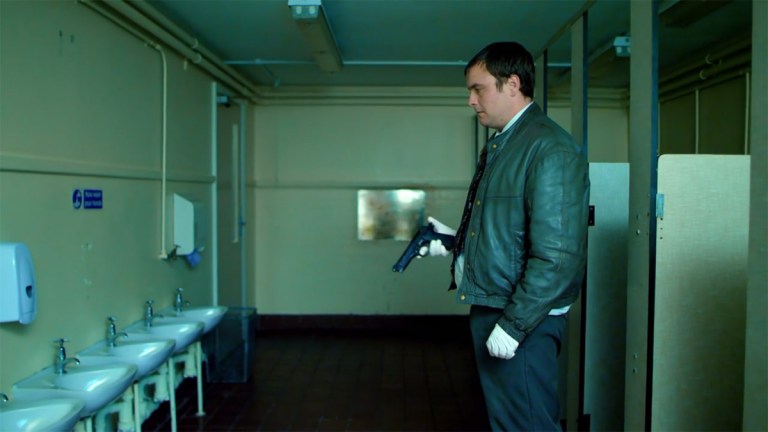Utopia Episode 3 Review
Be warned: Utopia’s tense third episode is its most unsettling yet. Here’s Louisa’s review…

This review contains spoilers.
The opening moments of this week’s Utopia were dreadful in the true sense of the word. They were dreadful to watch, and, once it was made clear what was happening, dreadful to anticipate.
Some will feel – perhaps justifiably – that the school shooting was a step too far into shock territory, but it’s not as if Utopia hadn’t prepared us. The tacit contract drawn up with viewers over the preceding episodes stated clearly that nobody, innocent or guilty, child or adult, was safe. After sitting through a terrified child’s execution, a man’s eye being gouged out, and a family being gassed to death in the name of entertainment, it’s a bit rich for the outrage to kick in only now.
That’s not to deny that it made for horribly uncomfortable viewing. The whole opening sequence was stomach-sinking, from Letts’ go-ahead, to the accidental smiley face on that acid yellow holdall contorted into a lopsided smirk, to the pan across Arby, sitting monstrously oversized and dumb in that cramped children’s cubicle, all accompanied by Cristobel Tapia de Veer’s eerie drone score.
Was it necessary? Plot-wise, Grant could have been framed for a less emotive, less nightmarish crime and still gained notoriety (Cat Bin Lady managed it). Did it teach us about The Network’s inhuman pragmatism? No more than we already knew. What it did though, was to cast a pall over the rest of the episode, which was Utopia at its most tense and captivating, and inch open the aperture into Arby’s character.
As Arby, Neil Maskell is steadily stealing Utopia. Given more dialogue than his monotonous, insistent “Where is Jessica Hyde?” mantra, it transpires that Arby is no recent recruit to The Network, but a lifelong member. A parent-less creation of Philip Carvel, the animal-killing Arby arrived as “part of a consignment from Bulgaria”, in Letts’ words. The inference being that through conditioning and probably pharmaceuticals, Carvel made Arby what he is today: a desensitised weapon of The Network.
What may soon present a problem to his creators is the fleeting glimmer of conscience Arby experienced in the school gymnasium, and again – if that’s what it was – when confronted with his methodically hunted quarry. I’m not sure what I expected to happen when he and Jessica Hyde finally came face-to-face, but it wasn’t for him to down tools, and plod numbly away. Like Frankenstein’s creature, Arby is beginning to question his origins, and woe betide the Doctor who made him.
His counterpart, Jessica Hyde, also revealed more of herself this week. Like Arby, she’s a weapon of sorts, a character robbed of her childhood and empathy. “It’s a handful of kids, so what?” was her cold-hearted response to the school massacre. Fiona O’Shaughnessy gave a better account of herself this time around, playing Jessica with a detached, robotic grief that made her scenes fascinating, if not entirely accessible.
Elsewhere, Dugdale was off on a daytrip to a remote Scottish isle, where he did all the usual tourist stuff: shouting at military checkpoints, hiding in quarantine tents, and stealing the fingers of flu-infected corpses. Working in tandem with tip-off scientist Donaldson (the ever-reliable Simon McBurney), Dugdale is going up against The Network to investigate the recent outbreak of deadly Russian flu, and somehow, I don’t fancy his chances.
At the half-way point in Utopia‘s story, we’re still left with a satisfying number of unanswered questions: who did Becky phone last week? How will MI5 Milner fit in? Why aren’t we seeing more of Wilson Wilson? Is liking Coldplay the result of years of evil organisation-fighting desensitisation? Is Stephen Rea’s Letts Mr Rabbit? Why is James Fox’ character known only as The Assistant? Why is Ian and Becky’s tedious romantic hook-up being pursued when so many more interesting things are going on? Does Jessica really only want the manuscript to get to know her dead, pro-eugenics scientist father? Is he even dead? Is he even her father? Why hasn’t this paragraph ended yet?
Looks-wise, things were as delicious as ever, with yet more psychotic yellow creeping menacingly into shot (on the boat, in the school gym…). And who would have thought that a loo paper dispenser could be the backdrop to such a gorgeously nasty shot as that finger-slicing number? By rights, director Marc Munden shouldn’t have to go looking for a single day’s work after Utopia. If they aren’t already, they’ll be hammering down his door.
